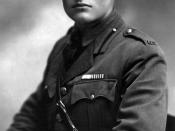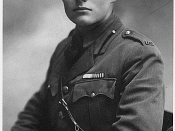Attitudes Towards War in A Farewell to Arms by Ernest Hemingway
Ernest Hemingway was one of the most influential writers of the Modern period. After being rejected from the army, Hemingway entered the war in 1917 as an ambulance driver on the Italian front. Hemingway's relationship with the war could have been his reason for writing his novel A Farewell to Arms. A Farewell to Arms takes place in Italy in World War I. The novel tells of the conflicts of an American ambulance driver on the Italian front, Frederick Henry, and his difficulties with war, love and death. In this particular novel, Hemingway expresses several different attitudes towards war through the characters Frederick Henry, Lieutenant Rinaldi, and Gino.
World War I has no extreme effect on Frederick Henry. He feels as though it is not his war to fight since his country has very little to do with it.
Henry does not even realize the seriousness of the war until it takes its toll on him. Frederick Henry mentions, "Well, I knew I would not be killed. Not in this war. It did not have anything to do with me. It seemed no more dangerous to me than war in the movies" (37; ch. 7). The war is no more than another adventure to Frederick Henry. It seems he is in the war just to have something to do. Catherine says to Henry " 'Why did you join up with the Italians?' 'I was in Italy,' I said, 'and I spoke Italian'" (22; ch. 5). Clearly Henry does not care much for the war. He feels uncomfortable with the passion others feel for it, such as Gino, and Henry exemplifies this when he mentions, "I was always embarrassed by the words sacred, glorious, sacrifice and the expression in...


